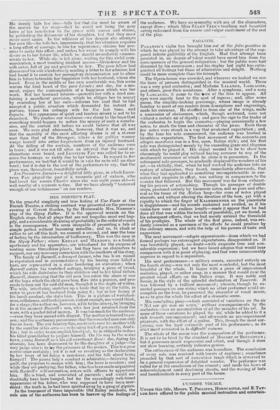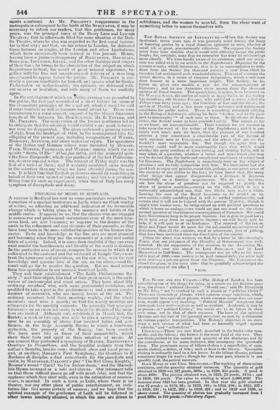L'UNIONE VOCALE.
UNDER this title, Messrs. T. PHILIPPS, HORNCASTLE, and E. TAY4 LOR have offered to the public musical instruction and entertain- ments combined. As Mr. PHILIPPS'S reappearance in the metropolis is subsequent to the birth of the SPECTATOR, it may be necessary to inform our readers, that this gentleman, for many years, was the principal tenor at the Drury Lane and Lyceum Theatres; that he afterwards filled the same situation at the Dub- lin Theatre, where he also was regarded as the first vocal instruc- tor in that city ; and that, on his return to London, he delivered those lectures on singing, at the London and other Institutions, which have occasionally been noticed in this journal. Hence, having been a junior contemporary of BILLINGTON, MOUNTAIN, STORACE, INCLEDON, KELLY, and the other distinguished sine-ers of their Mil?, he brings to the elucidation of the subject on which he professes to treat, the result of great musical experience, to- gether with the free and unembarrassed delivery of a man long accustomed to appear before the public. Mr. PHILIPPS is evi- dently a person who thinks for himself, and speaks what he thinks. Fashionable or unfashionable, his opinions are delivered with- out reserve or hesitation, and with many of them we cordially agree.
In the entertainment which on Friday evening was presented to the public, the first part consisted of a short lecture on some of the elementary principles of the vocal art, which it would be well if sonic teachers as well as learners would attend to. These were introductory to a vocal concert, supported by the Misses BRANDON (pupils of the lecturer), Mr. lioaNcAsroE, Mr. E. TAYLOR, and Mr. PHILIPPS. The cooperation of the former gentlemen led us to anticipate that the selection would exhibit s_tme good teatures ; nor were we disappointed. The glees embraced a pleasing variety of style:, from the madrigal of 1600, to the accompanied trio, the offspring of the present age, including compositions of WsiunE, HORSLEY, ATTIVOOD, and other writers or repute. The specimens of the Italian and German school were furnished by MOZART, PAER, WINTER, PAESIELLO, and WEBER: among which the ex- quisite " Sento., 0 Dio " (Cosijim tutte), and the animated quin- tetto from Euryauthe, which was produced at the last Philharmo• nic, deserve especial notice. The concert of Friday night was the fit st of a series of three; and it certainly combined more novelty in the selection than any which we have attended during the sea- son. It is high time that Enelish professors should do something in behalf of their own school of vocal music; and this is a peculiarly fitting. time for such an experiment, when that of Italy has every symptom of decrepitude and decay.



























 Previous page
Previous page